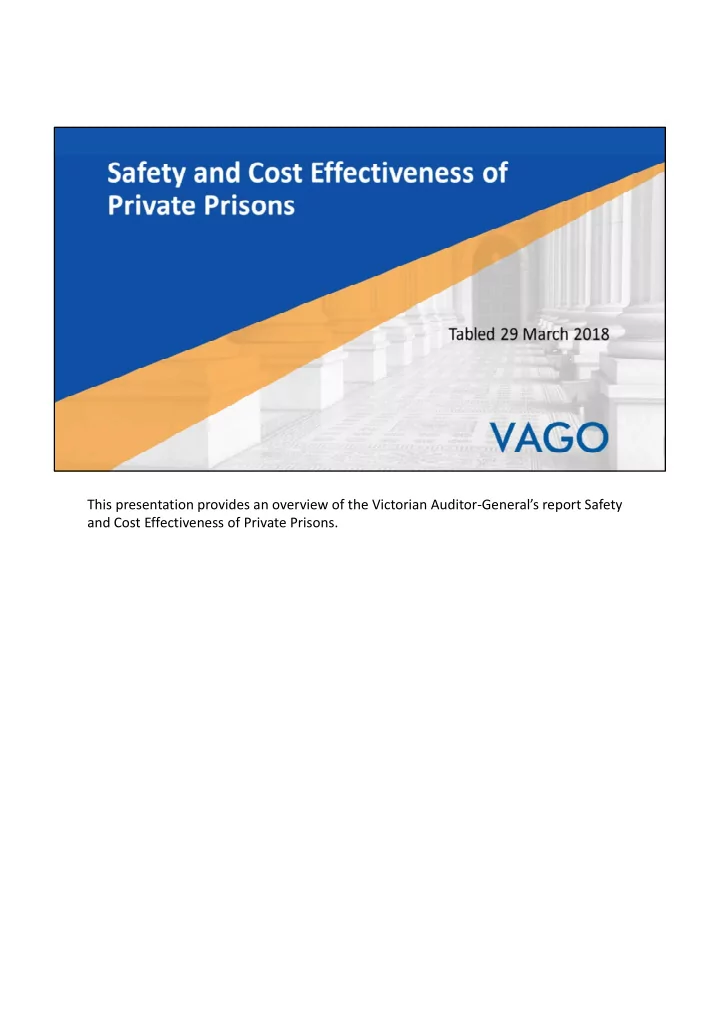

This presentation provides an overview of the Victorian Auditor ‐ General’s report Safety and Cost Effectiveness of Private Prisons.
Victoria’s men’s prison system is a considerable expense for the state – costing over $800 million to run in 2016 ‐ 17. The prison system faces significant challenges and risks, including • increasing prisoner numbers, particularly remand prisoners • Increasingly complex prisoner profile • Increasing assaults in prison, and • A more transient prison population that moves frequently between prisons. Recently there has been growing public concern about safety risks at Victoria’s prisons and the implications for prisoners, employees and the public.
Victoria’s privately operated prisons accommodated around a third of the state’s male prisoners in December 2017. The state recently extended the contracts with the private prison operators for up to 20 years, at a forecast cost of $4.5 billion in nominal terms. It is important to understand the cost of operating private prisons compared to public prisons. Corrections Victoria (CV), a division of the Department of Justice and Regulation (DJR), is responsible for managing the contracts with the private prison operators to ensure the safe custody and welfare of prisoners and that cost and risk transfer expectations are met.
We examined how well the private prisons are managing safety and security risks and whether they met the state’s expectations for service delivery and cost during the original contract terms. We also assessed how well DJR and the Department of Treasury and Finance (DTF) managed negotiations for the new contracts and whether they achieved value for money. This is the first audit where we used our ‘follow the dollar’ powers and directly engaged with the private prison operators.
The private prisons examined were: Port Phillip Prison (Port Phillip), which is a maximum ‐ security prison operated by G4S, and Fulham Correctional Centre (Fulham), which is a medium-security prison, operated by GEO
We found that: The private prisons deliver cost ‐ efficient services and have largely met their contracts’ service and performance requirements. CV demonstrates sound contract management and genuine engagement with Port Phillip and Fulham. DJR successfully negotiated new contracts that address key weaknesses in the initial contracts, at a cost consistent with government expectations. However, the prison operators are not always meeting the state’s expectations for key safety and security measures – particularly in relation to assaults in prison.
CV measures prison performance against service delivery outcomes (SDO), covering prisoner safety, security, health, welfare, activities and programs. The number of SDOs and the thresholds vary across prisons. CV rigorously monitors the private operators’ performance. This helps to ensure performance reporting is accurate and performance payments are correct. The new contracts introduced a tougher performance regime, with more pressure on private operators to turn poor performance around. We found that there is limited public reporting on private or public prison performance, impacting the transparency of the system.
We found that both private prisons have violence ‐ reduction strategies to reduce assaults. However, there is a lack of evaluation of these strategies, and the methods for investigating serious incidents need to improve. Deficiencies in CV’s legacy information systems impact on its ability to fully utilise incident data to understand and respond to trends.
Private prisons cost the state up to 20 per cent less to run than the average for public prisons of the same security rating. This is largely due to more efficient staff shift patterns.
The original service contracts for Fulham and Port Phillip were due to expire in 2017. DJR assessed options and recommended negotiating contract extensions with the existing operators, partly because of the cost involved in buying out the leases. The new contracts addressed key weaknesses in the initial contractual arrangements, and broadly met the cost limits approved by government. Advice to government throughout the process was sound.
We made six recommendations for DJR, including: address known IT systems issues by progressing the integrated offender management system increase public reporting on prison performance, and improve incident investigation methodology. We made two further recommendations for DTF, which are focused on: making sure advice to government and publicly available information on major transactions and projects is comprehensive and transparent, and improving the transparency of probity reports on major transactions.
For further information, please see the full report of this audit on our website, www.audit.vic.gov.au.
Recommend
More recommend